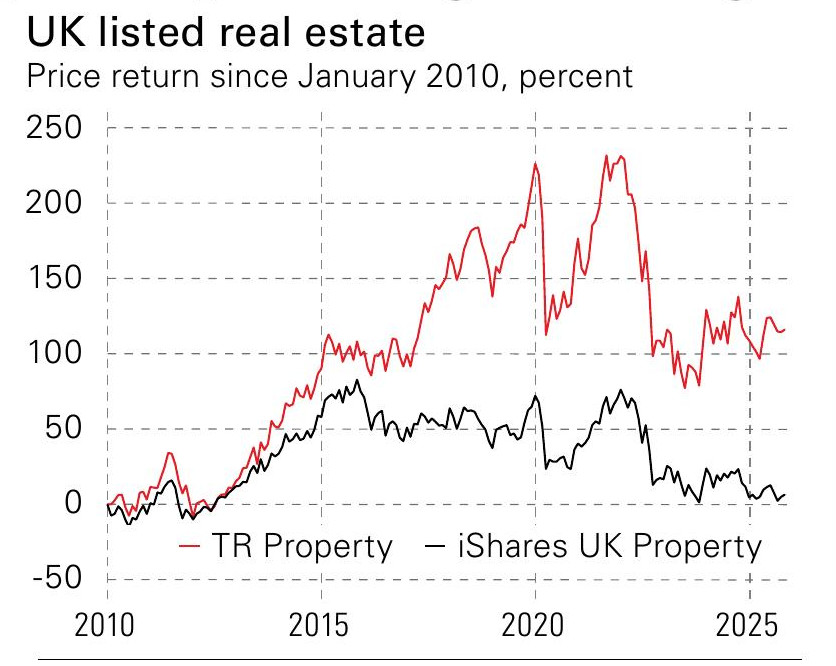Waiting for a UK REITs rally – is real estate poised for a rebound?
Investors are still cautious about UK REITs. Private equity is snapping them up. One view must be wrong, says Cris Sholto Heaton


Get the latest financial news, insights and expert analysis from our award-winning MoneyWeek team, to help you understand what really matters when it comes to your finances.
You are now subscribed
Your newsletter sign-up was successful
Want to add more newsletters?

Twice daily
MoneyWeek
Get the latest financial news, insights and expert analysis from our award-winning MoneyWeek team, to help you understand what really matters when it comes to your finances.

Four times a week
Look After My Bills
Sign up to our free money-saving newsletter, filled with the latest news and expert advice to help you find the best tips and deals for managing your bills. Start saving today!
There are times when either you are missing the obvious, or the market is. Commercial property feels like one of those times. Most UK real estate investment trusts (REITs) trade at wide discounts to net asset value (NAV), with shares still lower than they were a decade ago, despite a regular flow of solid operating updates from key players.
We can clearly worry about certain subsectors – eg, the oversupply of lower-grade offices, made fit only for redevelopment by new energy-efficiency standards or changing work patterns. Yet UK commercial real estate is very diverse: we tend to notice and talk about offices out of all proportion to their share, as Marcus Phayre-Mudge of TR Property Investment Trust (LSE: TRY) pointed out at the Association of Investment Companies Showcase last week. Pure office REITs are only around 5% of the total.
There are a few REITs that trade closer to NAV because of their distinctive strategies – improve-and-sell specialist AEW UK Reit (LSE: AEW), fast-growing LondonMetric Property (LSE: LMP), Sirius Real Estate (LSE: SRE) with its exposure to Germany, Supermarket Income Reit (LSE: SUPR) with its long, inflation-linked leases – but many are on 30%-plus discounts. This could imply NAVs are greatly overstated. Yet institutions such as Blackstone are snapping up smaller REITs at a premium to where they are trading (if still, usually, some discount to NAV).
MoneyWeek
Subscribe to MoneyWeek today and get your first six magazine issues absolutely FREE

Sign up to Money Morning
Don't miss the latest investment and personal finances news, market analysis, plus money-saving tips with our free twice-daily newsletter
Don't miss the latest investment and personal finances news, market analysis, plus money-saving tips with our free twice-daily newsletter
Why the uncertainty surrounding UK REITs?
There are a few top-down possibilities. First, investors were shocked by the rapid rise in interest rates in 2022. That makes them still cautious about where rates will be as REITs refinance maturing debt and the impact of that on earnings. Note how the sector tends to gyrate as five-year swap rates – a rough benchmark of how new debt will be priced – go up and down.
Second, the rise in longer-term bond yields will be affecting valuations. A fixed yield from a 10-year bond is not the same as income from a physical asset that varies with inflation and rental demand, but higher yields still influence where institutions put their money. This affects the underlying assets more directly than the listed REITs, but the uncertainty is not helpful.
Third, there are many self-reinforcing factors. A sector trading at persistent discounts cannot easily raise equity to fund deals. This means they cannot seize opportunities to snap up cheap assets as other investors exit the sector. They cannot grow and remain sub-scale, or fall behind the rising size and liquidity requirements that buyers such as wealth managers require. Thus the sector consolidates (okay), or is bought out by private equity (bad for public markets).
Real estate is of course very cyclical. Maybe it is now primed for a strong rebound, as Phayre-Mudge argues. In the meantime, TR Property (which invests across Europe and sees plenty of value in other countries as well), a passive fund such as iShares UK Property ETF (LSE: IUKP), or a diversified basket of REITs will all earn some income – TRY yields 5%, IUKP yields 4.3% – while waiting for sentiment to change.

This article was first published in MoneyWeek's magazine. Enjoy exclusive early access to news, opinion and analysis from our team of financial experts with a MoneyWeek subscription.
Get the latest financial news, insights and expert analysis from our award-winning MoneyWeek team, to help you understand what really matters when it comes to your finances.

Cris Sholt Heaton is the contributing editor for MoneyWeek.
He is an investment analyst and writer who has been contributing to MoneyWeek since 2006 and was managing editor of the magazine between 2016 and 2018. He is experienced in covering international investing, believing many investors still focus too much on their home markets and that it pays to take advantage of all the opportunities the world offers.
He often writes about Asian equities, international income and global asset allocation.
-
 Can US small caps survive the software selloff?
Can US small caps survive the software selloff?US stocks have made their worst start to a year since 1995 relative to a global benchmark. But experts think some sectors of the market are still worth buying.
-
 Review: Eliamos Villas Hotel & Spa – revel in the quiet madness of Kefalonia
Review: Eliamos Villas Hotel & Spa – revel in the quiet madness of KefaloniaTravel Eliamos Villas Hotel & Spa on the Greek island of Kefalonia is a restful sanctuary for the mind, body and soul
-
 Three key winners from the AI boom and beyond
Three key winners from the AI boom and beyondJames Harries of the Trojan Global Income Fund picks three promising stocks that transcend the hype of the AI boom
-
 RTX Corporation is a strong player in a growth market
RTX Corporation is a strong player in a growth marketRTX Corporation’s order backlog means investors can look forward to years of rising profits
-
 Profit from MSCI – the backbone of finance
Profit from MSCI – the backbone of financeAs an index provider, MSCI is a key part of the global financial system. Its shares look cheap
-
 'AI is the real deal – it will change our world in more ways than we can imagine'
'AI is the real deal – it will change our world in more ways than we can imagine'Interview Rob Arnott of Research Affiliates talks to Andrew Van Sickle about the AI bubble, the impact of tariffs on inflation and the outlook for gold and China
-
 Should investors join the rush for venture-capital trusts?
Should investors join the rush for venture-capital trusts?Opinion Investors hoping to buy into venture-capital trusts before the end of the tax year may need to move quickly, says David Prosser
-
 Food and drinks giants seek an image makeover – here's what they're doing
Food and drinks giants seek an image makeover – here's what they're doingThe global food and drink industry is having to change pace to retain its famous appeal for defensive investors. Who will be the winners?
-
 Barings Emerging Europe trust bounces back from Russia woes
Barings Emerging Europe trust bounces back from Russia woesBarings Emerging Europe trust has added the Middle East and Africa to its mandate, delivering a strong recovery, says Max King
-
 How a dovish Federal Reserve could affect you
How a dovish Federal Reserve could affect youTrump’s pick for the US Federal Reserve is not so much of a yes-man as his rival, but interest rates will still come down quickly, says Cris Sholto Heaton